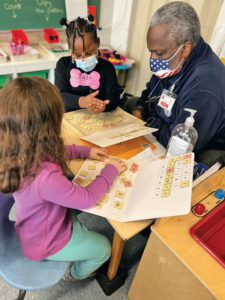Nehemiah Thomas, known to the children in Rachael Varga’s kindergarten class at Mitchell Elementary as Grandpa Thomas, taught Emily that her nickname, Em, begins with an E. “She always started with an ‘M,’” he explains, “because we call her ‘Em.’”
Varga says Thomas knows the children well. He noticed one was interested in cars and asked to bring a book about cars to class. Sometimes, when her patience wears thin, he asks to speak to the class and calms them down.
Thomas is delighted with his experiences with “precious, priceless, impressionable sponges, who are eager to learn.” The children reciprocate, running to him as his shift ends. “We had to move my desk over near the door,” he says, so kids could hug him on their way out.

Foster Grandparent Nehemiah Thomas helps kindergartners at Mitchell Elementary. | Photo: Rachel Varga
Thomas works in the Foster Grandparent Program, which runs under the umbrella of AmeriCorps, a national agency for community service and volunteerism. The Washtenaw County grandparent program brings together low-income seniors, aged fifty-five and up, and children who might not qualify for special education but need extra attention to thrive.
Supervisor Sandy Bowers tries to match the grandparent to the teacher. One teacher might want academic support, another emotional support, or the chance for children to experience another generation.
Seniors work in day care centers and preschools as well as elementary schools for twenty hours a week in five-hour shifts from Monday to Thursday. Volunteers receive a nontaxable stipend of $3.15 an hour, transportation, and lunches. Most foster grandparents are real grandparents, too; one has grandchildren in Jamaica.
There are spots for sixty seniors in the Washtenaw Country program, with fifty now filled. There are more grandmothers than grandfathers, and a couple of married couples, too. These days, some work virtually, some in schools with safety protocols. They do twenty hours of training before starting, and monthly in-service sessions add advice from experts and an opportunity to share questions and achievements.
Varga says Thomas is a “social mirror and role model” for her students, noting that just 38 percent of the students at Mitchell are Caucasian, the rest a mix of African Americans, Latinos, and others. “We celebrate our diversity and weave our cultures into our learnings,” she says. An African American grandpa in a Caucasian teacher’s classroom helps.
“One teacher at Perry Early Learning Center in Ypsilanti had a child who didn’t talk until a grandmother started working with her,” Bowers recalls. “The grandmother is a quiet person, content to silently support the child … the child opened up and began talking to others.
“Just by being there, the grandmother created, maybe, a safe space, or a feeling of being accepted. The really successful grandparents have found a way to be themselves and are matched in a setting where that’s appreciated.”
It’s not just grandparents and children who benefit. “I want to shout it from the rooftops,” Varga exclaims. “This is a wonderful free resource all teachers should use!”
Beyond classroom help, Varga and Thomas are friends. “He’s part of our family,” she says, adding that he’s come to her kids T-ball games.
“It doesn’t always work,” Bowers reflects. “But when it works, it works like this.”